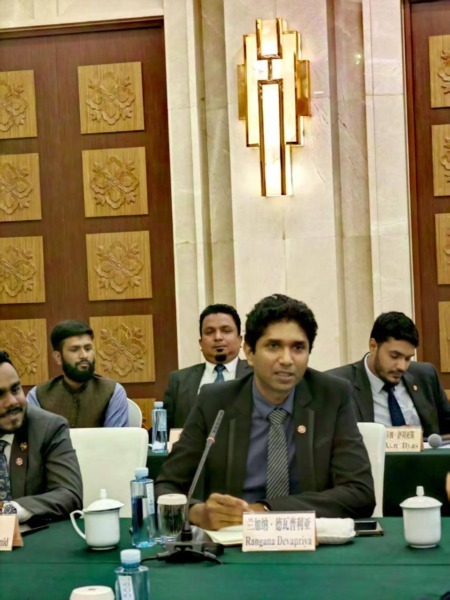-By LeN Foreign Affairs Correspondent

(Lanka-e-News -29.April.2025, 11.00 PM) In a move symbolising the evolution of global leftist engagement, Sri Lanka's Janatha Vimukthi Peramuna (JVP)—the island nation’s most prominent Marxist party—made a notable appearance at the recent political forum of the Shanghai Cooperation Organisation (SCO) in China. The event, hosted in Urumqi, capital of the Xinjiang Uyghur Autonomous Region, took place over two days on April 23 and 24, and brought together political representatives from a wide sweep of countries including China, Russia, India, Pakistan, Nepal, Turkey, Iran, Qatar, and Armenia.
Representing the JVP at this high-level congregation were two significant figures: Rangana Devapriya, National Organiser of the Socialist Students' Union, and Arkham Ilyas, Member of Parliament from the JVP-aligned National People's Power coalition. Their attendance underscores Sri Lanka’s subtle pivot towards deeper multilateral ties with China, amid shifting power dynamics in South Asia.
The SCO’s political parties forum—held under the strategic gaze of the Chinese Communist Party (CCP)—was not just ceremonial diplomacy. It featured a series of policy seminars and closed-door discussions examining China’s strides in artificial intelligence, digitalisation, and modern industrial transformation. Of particular focus was the CCP’s technocratic vision for governance in the “new era”, as well as the central party-led model guiding the country’s economic and technological resurgence.
Two days prior, on April 21 and 22, participants from political parties and organisations worldwide were invited to Chongqing for preparatory workshops and dialogues. These sessions explored the implications of AI and digital economies, and how China's one-party system claims to align innovation with ideological discipline.
But perhaps more intriguing than the seminar rooms was the meticulously curated exposure tour—a model of China’s political soft power. Delegates, including the Sri Lankan representatives, visited an array of state-of-the-art facilities: vehicle manufacturing plants leveraging AI, domestic pharmaceutical factories, waste-to-energy power stations, high-tech smart farms, and pioneering hydrogen-based renewable energy installations. These tours served as a performative display of China’s industrial self-reliance and environmental adaptability, tightly choreographed to showcase the Party’s achievements to international guests.
One of the more politically sensitive aspects of the itinerary was the visit to Xinjiang itself—a region still under the global spotlight due to past accusations of ethnic repression and mass surveillance. Yet the Chinese authorities, in a masterclass of diplomatic image management, presented Xinjiang as a triumph of state-led reconciliation. Delegates were shown rural harmony, ethnic diversity, and cultural integration. Carefully planned excursions to cultural centres and villages highlighted how the CCP claims to have “defeated extremism” and built a model of multi-ethnic coexistence—a narrative far removed from Western media portrayals.
This forum wasn’t just a dialogue; it was a showcase, a performance of political modernity. For China, it was about exporting its governance model—technologically infused authoritarianism with Confucian socialist characteristics—as an alternative to liberal democracy. For the JVP, attendance signified an effort to reposition itself within a wider global anti-imperialist discourse and to build solidarity with like-minded political movements across Asia.
Critics might question the optics: A leftist party from Sri Lanka lending symbolic legitimacy to a regime accused of human rights violations. But for the JVP, which has long framed itself as anti-Western and anti-imperialist, this is ideological realignment rather than contradiction. The platform offered by China grants them not only geopolitical relevance but also access to strategic dialogue on post-capitalist statecraft in a multipolar world.
In the wider geopolitical calculus, Sri Lanka’s presence—albeit via a non-governmental political actor—signals the island's deepening entanglement in the contest between the US-led liberal order and China’s rising alternative. As Colombo seeks investments and debt relief, China is extending not just credit lines, but ideological kinship.
As the red banners of communism continue to flutter over Urumqi, the JVP’s participation may mark a quiet yet meaningful chapter in Sri Lanka’s foreign policy evolution—a chapter written not in official communiqués, but in the language of transnational party-to-party diplomacy.
-By LeN Foreign Affairs Correspondent
---------------------------
by (2025-04-29 17:52:42)
Leave a Reply